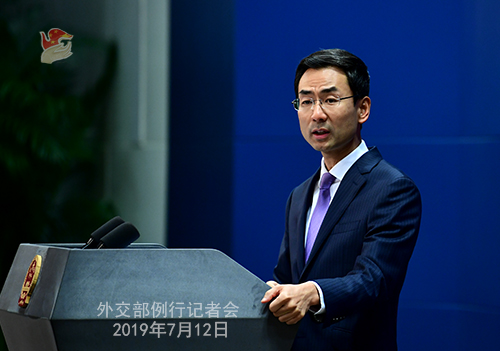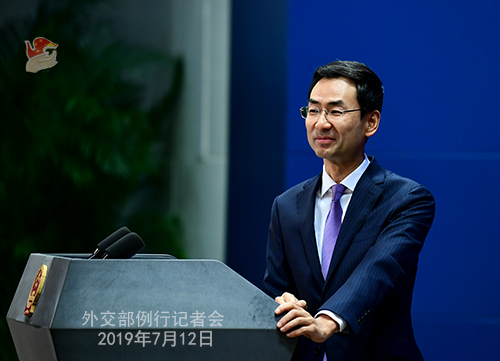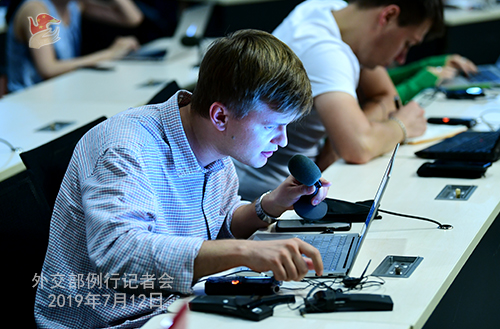| Foreign Ministry Spokesperson Geng Shuang's Regular Press Conference on July 12, 2019 |
| 2019-07-12 19:45 |
|
Q: It was reported on July 11 that according to a source in the US, the country is considering offering a 12- to 18-month suspension of certain sanctions on the DPRK in exchange for the dismantlement of its main nuclear facility and a freeze of the entire nuclear program. The potential offer would see the suspension of sanctions restricting the DPRK's exports of coal and textiles. But the US Department of State made clarifications on this issue afterwards. I wonder if you have any comment on that? A: We note the relevant reports. It has been China's consistent position that the Security Council should, pursuant to provisions of relevant resolutions and taking into account positive progress on the Peninsula, especially the DPRK's steps toward denuclearization, begin discussing invoking relevant provisions to modify sanctions at approriate time. President Xi elaborated on China's principled position on the Peninsula issue during his meeting with President Trump in Osaka. He encouraged the US to be flexible, meet the DPRK halfway by lifting some sanctions in due course and doing other things, and find ways to resolve each other's concerns through dialogue. Under the current circumstances, we call on all relevant parties to view this issue in a constructive manner, stay in contact, engage in more dialogue, show flexibility, accommodate all parties'legitimate concerns in a balanced way and work for early realization of denuclearization on the Peninsula and lasting peace and stability of the region. Q: President Donald Trump is accusing China of letting the US down by not promptly buying more US farm products and said that "hopefully, they will start soon." The US Treasury Department denied that it had called on American companies to apply for exemptions relating to their business with Huawei as early as possible. What's your response? A: On trade in agricultural products, the spokesperson of the Commerce Ministry made responses at a press conference yesterday. I would like to reiterate that we believe China and the US should discuss and resolve the issue of trade in agricultural products on the basis of equality and mutual respect. Regarding your second question, China's position is very clear, too. The US has been making trumped-up accusations to bring down Huawei and other Chinese businesses. Such acts have undermined the legitimate rights and interests of Chinese companies as well as the interests of American enterprises. It has severely disrupted the normal scientific and technological exchange and trade between the two countries and worldwide. It has also broken the global industrial chain and supply chain. As you may noticed, President Trump said in his meeting with President Xi in Osaka that he would allow American companies to supply Huawei. We welcome what he said and hope the US side will honor its words. Q: You said the other day that the vocational education and training centers in Xinjiang are set up as a preventive measure for counterterrorism and deradicalization purposes. But some foreign media reports say there may be similar institutions in Tibet. Can you tell us anything about it? A: Those foreign media reports are just nonsense. Q: American newspaper POLITICO quoted its sources in the American government, claiming that some US officials on the National Security Council are now pushing for the US to impose secondary sanctions on Chinese entities for oil purchases from Iran. Does the Foreign Ministry have any comment on that? A: We stressed many times that the normal trade under international law between Iran and the rest of the international community, China included, is legal and legitimate, thus should be respected and protected. China opposes unilateral sanctions and the so-called long-arm jurisdiction. We will firmly defend our legal and legitimate rights and interests.
Q: Canadian Foreign Minister Freeland said during an interview that Canada followed the rule of law and arrested Meng Wanzhou according to its extradition treaty with the US. There was no political intervention in this. She personally feels heartbreaking for the current difficulties in China-Canada relations, but she is 100 percent sure that Canada has made the right choice. She also believes "it is wrong" that former Prime Minister Jean Chretien suggested to terminate the extradition process of the Meng Wanzhou case. Do you have any comment on that? A: China deplores the erroneous remarks recently made by Canadian officials on the Meng Wanzhou case and China-Canada relations. Our position on the Meng case is clear and firm. The US and Canada have abused their bilateral extradition treaty and arbitrarily taken compulsory measures on a Chinese citizen. It is a serious violation of the legitimate rights and interests of a Chinese citizen. It is also a serious political incident. Many people with vision in Canada have made fair and objective comments. But the Canadian side still turns a deaf ear to them and insists on taking a wrong stance. We strongly urge Canada to take our solemn concerns seriously, immediately release Ms. Meng and ensure that she returns to China safe and sound. Q: On July 10, during a press conference in Freitas Family Farm in California, US Vice President Pence said that America is a beacon of freedom for all the world. The US administration has spoken out on religious liberty around the world. There will be another ministerial conference in Washington, D.C. next week to address those issues in China and all over the world. Do you have any comment? A: The US calls itself a "beacon of freedom in the world", but this beacon doesn't seem very illuminating. It wants to address issues in China and all over the world. What a bragger! It has no responsibility, no mandate and no capability to do so. Why can't it just put its own house in order first? As for next week's ministerial conference to advance so-called "religious freedom", China's position is consistent. We oppose the US interference in other countries' internal affairs under the pretext of religion. We urge the US to respect the facts, abandon biases ion and adopt an objective and fair attitude toward the religious policies and freedom of religious belief in China and other countries. In fact, it really needs to do more to advance China-US relations and friendship among countries. Q: Taiwanese "president" Tsai Ing-wen is on a two-day visit to the US. What does the foreign ministry think about the visit given the recent arms sale from the US to Taiwan? A: I'm afraid I need to correct you on this: we call her the leader of the Taiwan region, and there is no so-called "president" in that region. Regarding the "transit" of the leader of the Taiwan region in the US, we have made clear our solemn position. Here I'd like to emphasize this again. China opposes official exchange between the US and Taiwan. This position is firm and clear. We have made stern representations to the US side. We urge the US to abide by the one-China principle and the three China-US Joint Communiques, not allow Tsai Ing-wen's transit and stop the official exchange with Taiwan. It must no longer provide any platform for the separatists to advocate "Taiwan Independence". It needs to deal with Taiwan-related issues properly and with caution to avoid damaging China-US relationship and peace and stability across the Taiwan Straits. As we stated, China's position on US arms sales to Taiwan is also stern. We urge the US to cancel the arms sales immediately and cut its military ties with Taiwan. Q: Yesterday in a press conference, Spokesperson Ortagus of the US Department of State mentioned the day July 12th marked three years since an arbitral tribunal made its decision on the South China Sea. She urged all countries to resolve their territorial and maritime disputes in accordance with international law including the UNCLOS. I wonder if you have any response to that? A: China has made clear its position on the so-called South China Sea Arbitration on many occasions. The arbitral tribunal itself was established on an unlawful basis. It willfully expanded its power to exercise jurisdiction and make an award, which is null and void. China does not accept or recognize that. I also have something to say in response to the US comments. Being a non-party to the UNCLOS, the US has been a keen talker of it and using it as a tool to lecture others. The US, having withdrawn from the UN Human Rights Council, took the council as a platform to wantonly criticize and interfere in other countries' human rights conditions. Also the US, having unilaterally exited the JCPOA, asked the IAEA to hold a special session on the implementation of the JCPOA. Isn't it absurd? If you look at the absurd things the US has done closely, you see nothing but double standard, hegemonic thinking and ugly hypocrisy.
Q: US National Security Adviser John Bolton met with a Hong Kong businessman Jimmy Lai and talked about the amendment bill. Before that, Jimmy Lai also met with US Vice President Pence and Secretary of State Pompeo. What is your comment on this? A: While turning a blind eye to international law and the basic norms governing international relations, a handful of US politicians have repeatedly interfered in the affairs of Hong Kong and China's internal affairs. They have sent a seriously wrong signal to the world. China deplores and firmly opposes that. We have made stern representations to the US side. China is committed to defending national sovereignty, security and development interests. We are determined to safeguard Hong Kong's prosperity and stability. We resolutely oppose external intervention. Attempts to incite chaos and undermine prosperity and stability in Hong Kong will be opposed by all Chinese people including residents in Hong Kong. Such attempts will not gain any popularity or succeed. Q: The US has asked its allies to contribute to a US-led military coalition to safeguard waters off Iran and Yemen. Officials in the region said the US has told them it would contact Japan, South Korea and China among others to ask them to take part. Has the United States reached out to China to take part in this coalition? Will China take part in such a coalition? Does China have any plan to escort commercial vessels under the Chinese flag? A: I'm not aware of what you said. I'd like to say this again: the gulf region is important to international energy supply and global security and stability. Under the current circumstances, we hope all relevant parties can exercise restraint, do not take measures that may escalate tensions, and jointly safeguard security of passage through the straits and regional peace and stability. Q: I have a question about the drug case in Xuzhou which involved 16 foreigners. I was wondering if you have details about the case, specifically the nationalities of these foreigners? A: The public security authority in Jiangsu Province recently found a drug case involving foreigners. The case is now under investigation. The public security authority has made consular notifications to the embassies or consulates of countries involved. The legitimate rights and interests of those concerned are lawfully protected. This is all I know for now. Q: About this particular case you mentioned, do you have the names of the countries that those foreigners come from? A: I'm afraid I don't. I will check on that after the press conference.
|
 |
|



